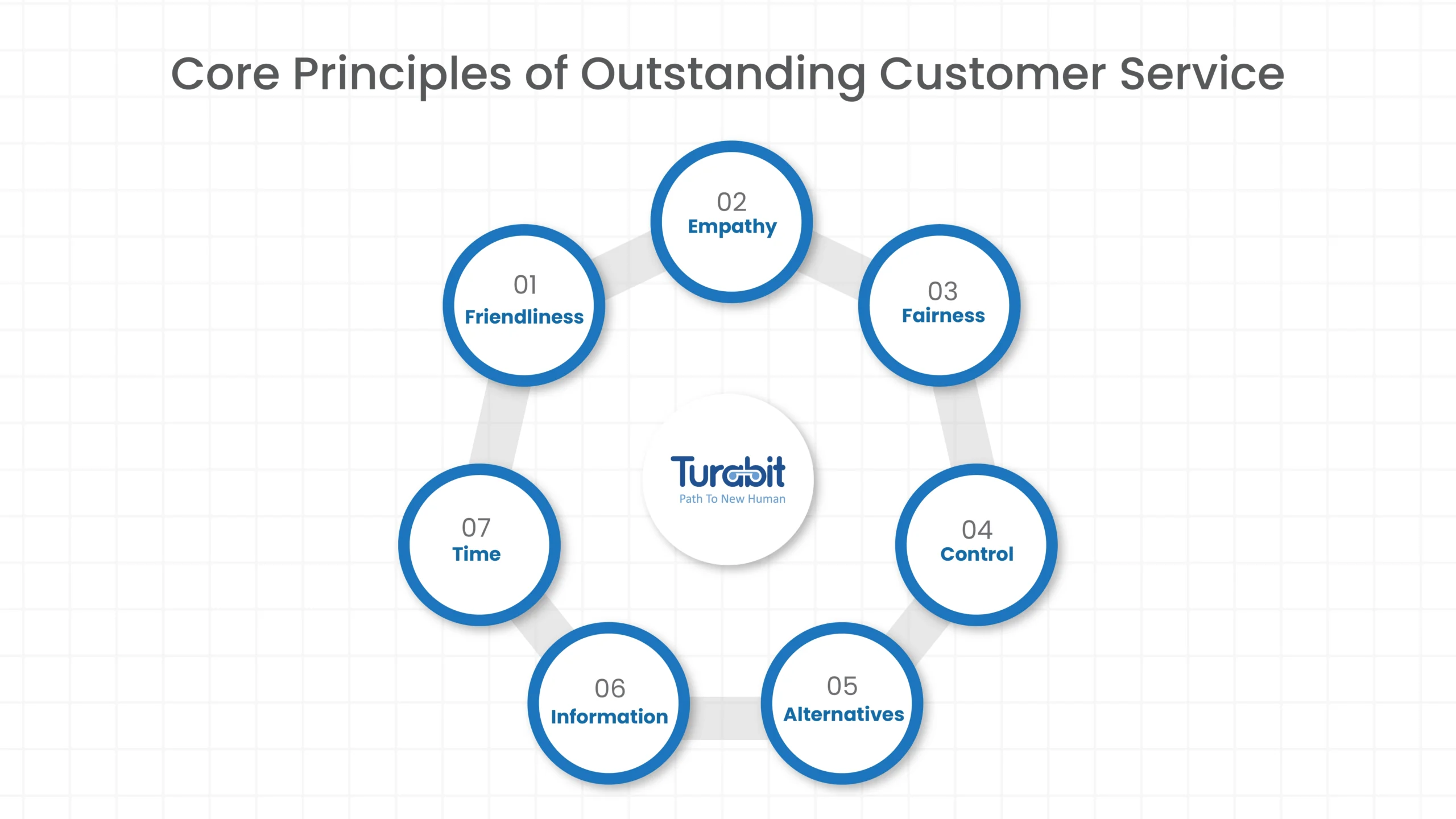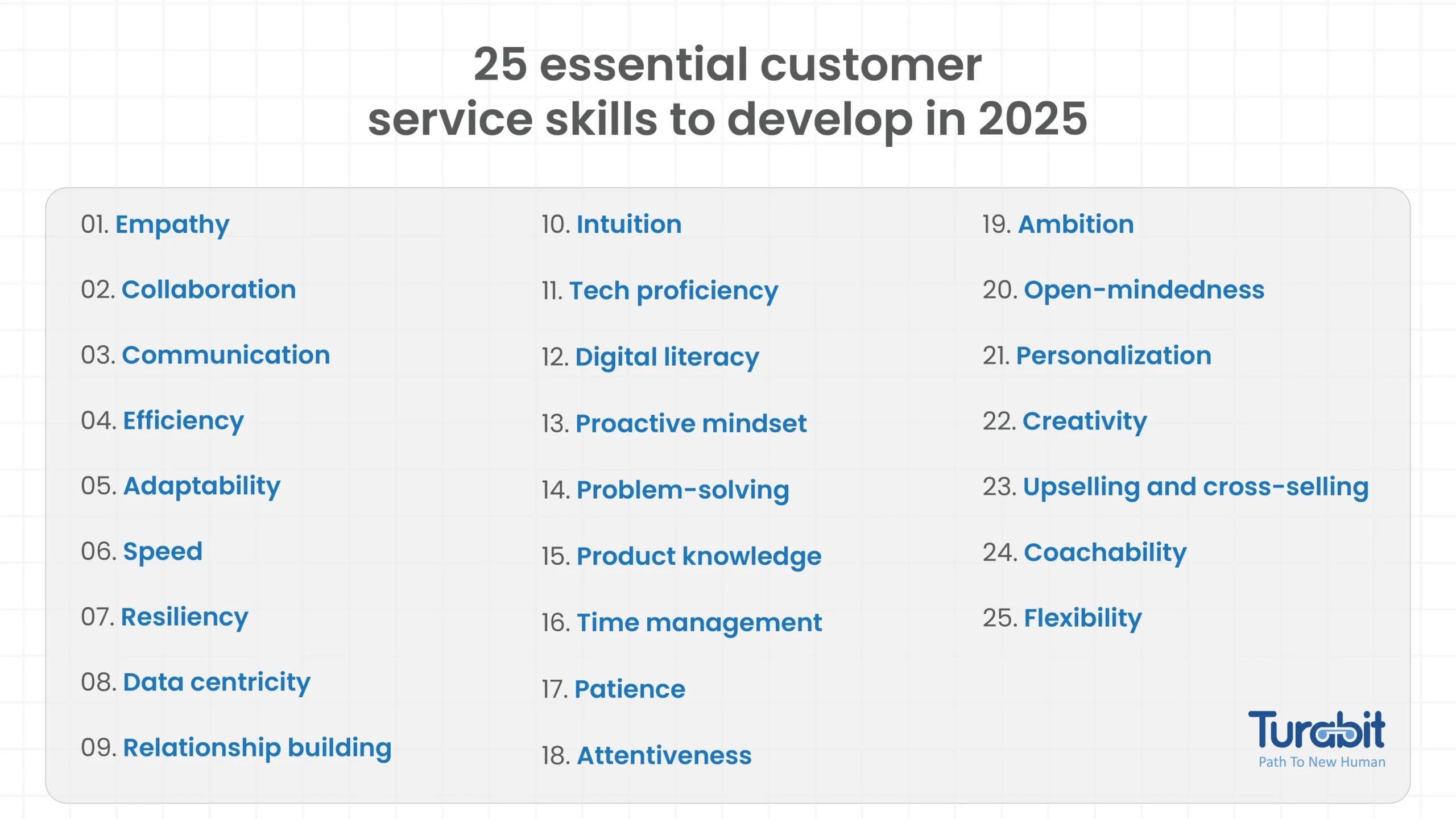As the customer journey undergoes rapid evolution and the digital marketplace continuously reshapes itself, one thing remains crystal clear: strong customer service skills are irreplaceable.
With both online and offline shopping choices expanding, customers have come to expect a higher standard of service, one that’s fast, personal, and intuitive.
In a world where transactions are increasingly quick and impersonal, a successful customer experience (CX) strategy needs more than just digital tools.
It’s as much about empathy and active problem-solving as it is about technical expertise. Today’s support teams are expected to read between the lines, understanding both the technical issues and the emotional context of each customer interaction.
This mix of digital literacy and interpersonal skill sets the foundation for not just resolving issues, but creating lasting, positive impressions.
What is Customer Service?
Customer service is all about providing meaningful support to buyers from their first interaction with your business through every step of their journey.
Whether it’s answering questions in person, handling requests via phone, chat, email, or social media, or managing post-sale follow-ups, customer service is the backbone of every buyer’s experience with your brand.
Effective support teams don’t just respond to inquiries, they’re actively documenting interactions, creating self-service options, and working to understand each customer’s needs more deeply.
While customer service and customer support are often used interchangeably, standout teams focus on flexibility, collaboration, and the guiding principles that define stellar customer service.
Businesses that invest in strong training programs and prioritize high hiring standards recognize that great customer service isn’t just a “nice-to-have.” It’s a strategic element essential for reaching business objectives, building brand loyalty, and enabling scalable growth.
Why is Customer Service Important?
Customer service is a cornerstone of a company’s success, affecting every part of the customer journey. Whether in sales, support, or any frontline position, human connection and strong relationships are essential. Poor customer service can tarnish a brand, while exceptional service builds loyalty and fosters growth. Here’s how it makes an impact:
Boosts Satisfaction and Retention: Customers who feel heard and valued are more likely to return and stay loyal, generating reliable, recurring revenue streams.
Strengthens Relationships: Personalized, empathetic interactions create bonds with customers that go beyond transactions, building trust and enhancing brand affinity.
Drives Brand Advocacy: Satisfied customers are the best promoters. When people have positive experiences, they’re more likely to recommend your brand to others, organically boosting awareness.
Supports Sales Growth: Consistent, high-quality service leads to repurchases and referrals. Loyal customers often spend more over time and introduce new business through word-of-mouth.
Exceptional customer service agents bridge the gap between customer needs and business objectives, offering insights into customer behaviors, trends, and expectations.
By truly understanding and meeting these needs, businesses not only support immediate sales goals but build a foundation for sustainable growth and an adaptable customer-centric culture.
What are the Core Principles of Outstanding Customer Service?

Achieving great customer service is about surpassing the baseline of “good” and setting a standard for excellent service interactions. Effective customer service management hinges on seven guiding principles that empower agents to deliver outstanding service and foster positive customer relationships.
Here’s a deeper look at these principles:
Friendliness: This isn’t just about politeness, friendliness is about making customers feel genuinely welcome and valued from the first interaction.
Empathy: Customers seek understanding. By fostering a real connection and showing empathy, support agents make customers feel heard and supported.
Fairness: When issues arise, customers expect fair solutions and adequate compensation. Fairness builds trust and makes customers feel valued, even when problems occur.
Control: Today’s customers want flexibility in how they reach out for support, whether through live chat, social media, or phone. Offering choices strengthens the customer experience and meets varied preferences.
Alternatives: When multiple solutions exist, customers appreciate the freedom to choose. Empowering customers to decide fosters satisfaction and makes them feel part of the solution.
Information: Customers expect timely and accurate answers or, at the very least, updates. Transparency about response time and progress reassures customers that their concerns are being addressed.
Time: Time is crucial. No one enjoys waiting, so making accessible, self-service options available helps customers quickly find answers to basic questions and avoid lengthy waits.
By embodying these principles, customer service teams can build a reputation for reliable, customer-focused support, ensuring every interaction leaves a positive impression.
Related read: What Are the Core Principles of Outstanding Customer Service?
25 Essential Customer Service Skills to Develop in 2025

For any business aiming to stand out in a competitive market, hiring agents with the right customer service skills is essential. These skills don’t just make day-to-day operations smoother, they help shape positive experiences that keep customers coming back.
If you’re a hiring manager, keep an eye out for these vital skills when screening candidates’ resumes and interviewing for roles that require exceptional customer service.
And if you’re exploring new opportunities in customer support, these skills highlight areas you can refine to contribute significantly to any organization’s customer experience.
1. Empathy
Empathy is the backbone of every strong customer relationship and is especially valuable for resolving tense or challenging situations. A service agent with high emotional intelligence can genuinely connect with frustrated customers, show understanding, and skillfully guide conversations toward solutions that meet customer needs.
For companies that prioritize this trait, allowing agents some flexibility, like making exceptions to certain policies without constant supervision, can enhance customer satisfaction.
This approach doesn’t just solve the immediate issue; it builds customer loyalty and trust in the brand, both critical goals for any customer-focused business.
2. Collaboration
Successful customer service hinges on effective collaboration, both within teams and across departments.
In today’s remote and hybrid work setups, where agents may not be able to chat face-to-face, maintaining strong teamwork has become even more crucial. The need to exchange ideas and problem-solve together remains essential, even if it’s done virtually.
By equipping customer service teams with AI Assistants that integrates with communication tools like MS Teams, companies can make collaboration effortless.
Agents can quickly reach colleagues or tap into the expertise of other departments, whether they’re in the office or working remotely from a beach in Hawaii! This setup ensures that customer issues are addressed with full company support, ultimately leading to faster, more thorough responses.
3. Communication
To elevate the customer experience, agents must excel in both written and verbal communication. Regardless of the customer’s background or the issue at hand, support representatives should be well-versed in:
* Selecting the most suitable communication channels for various situations.
* Identifying the right person to consult for quick and accurate answers to specific inquiries.
* Knowing when to escalate a support ticket and which team member will resolve the issue.
* Maintaining transparency with customers while adopting an appropriate tone of voice.
Strong communication abilities enable agents to effectively juggle their tasks and build rapport with customers. Each interaction is a chance to foster a positive experience, leaving customers satisfied and more likely to return.
4. Efficiency
Customer support agents often find themselves inundated with a high volume of open tickets. Yet, when an agent demonstrates efficiency, they can handle tasks more swiftly, benefiting both themselves and the organization. Key advantages of improved agent efficiency include:
Cost Savings: Enhancing agent productivity helps businesses cut operational costs, allowing for potential raises and improved benefits.
Quicker Ticket Resolutions: Agents equipped with strong multitasking skills can turn overwhelming workloads into manageable tasks.
Reduced Average Handle Time: With the right knowledge, automation tools, and proactive support options, agents can handle customer interactions more swiftly.
Many companies now leverage automated software and AI technologies to enhance productivity. Customer service managers are increasingly tasked with integrating AI into team workflows to boost efficiency, foster tech adoption, and systematize feedback.
5. Adaptability
Today’s customers engage through various channels like social media, SMS, email, and live chat. This reality demands that customer service agents be versatile and ready to adapt to any platform.
Their ability to switch seamlessly between these communication modes is crucial for delivering an exceptional customer experience. Adaptable agents are not just flexible in their communication styles; they also stay attuned to evolving market trends and shifting customer needs.
This adaptability fosters a strong customer orientation, allowing agents to respond effectively to diverse inquiries and preferences.
As the customer service industry continues to embrace emerging technologies and transitions to remote and hybrid support models, adaptability has become a fundamental skill, no longer just a nice-to-have but an essential requirement for success.
6. Speed
When it comes to customer service, speed is everything. Most customers are not keen on twiddling their thumbs waiting for a response.
To meet their expectations, agents need to keep pace with the standard communication times, whether that’s a few seconds, minutes, or even hours, across all the platforms they’re using.
This urgency isn’t just about replying quickly; it also extends to how fast new agents can get up to speed with the skills and tools necessary for success. The quicker they can resolve support issues, the happier the customers will be.
Fast-tracking training for new hires and implementing streamlined processes can help ensure that speed remains a top priority, making the entire support experience feel seamless and efficient.
7. Resiliency
Top-notch customer service teams thrive on resilience, bouncing back from tough feedback without losing their drive. Resilient agents are those who can accept criticism and use it to grow, turning negative experiences into learning opportunities.
Grace Under Pressure: Resilient agents understand that not all customers will be happy. They handle criticism with professionalism and can quickly process customer frustrations.
Adapt and Overcome: Instead of being discouraged, resilient agents find ways to respond effectively to complaints, ensuring they maintain a positive outlook for future interactions.
8. Data Centricity
In the age of information, data-centricity is essential for enhancing customer service. Agents should harness data analytics to gather insights that directly improve their performance and customer experiences.
Understand Customer Behavior: By analyzing data, agents can discern communication preferences and purchasing patterns, leading to tailored interactions.
Identify Recurring Issues: Data helps agents spot repeated problems, allowing them to resolve these issues swiftly and efficiently. With the help AI and Automation this can be easily streamlined.
Self-Assessment: Agents can use performance metrics to gauge their effectiveness and understand their role within the larger team context.
9. Relationship Building
Cultivating a customer-centric culture is key to fostering strong relationships between agents and customers. This requires a blend of interpersonal skills and emotional intelligence.
Personalization Matters: Equipping agents with the necessary context allows them to tailor their conversations, building trust and rapport with customers.
Strengthening Connections: When agents connect on a personal level, customers are more likely to return, fostering loyalty and increasing opportunities for upselling.
10. Intuition
Intuition plays a crucial role in customer service, allowing agents to anticipate customer needs effectively. Agents should be able to draw from their knowledge base to provide timely solutions.
Immediate Insights: Customers appreciate not having to repeat their issues, so intuitive agents can quickly sift through details to identify needs.
Efficient Problem Resolution: By anticipating questions and concerns, intuitive agents streamline the support process and enhance customer satisfaction.
11. Tech Proficiency
As technology continues to evolve, customer service agents must stay up-to-date with tools like Conversational AI and AI Assistants that can streamline support processes.
Embrace New Tools: Although there may be some apprehension about integrating new technology, understanding how to utilize these tools can lead to improved efficiency and customer satisfaction.
Focus on Complex Issues: AI Assistants can handle repetitive questions, allowing agents to concentrate on more intricate customer concerns.
12. Digital Literacy
With the shift to remote and hybrid work environments, digital literacy has become indispensable. This includes the technical skills to navigate online platforms effectively.
Adapting to New Tools: While agents may not be familiar with every platform, their ability to learn and adapt quickly is crucial for maintaining effective communication.
Enhanced Communication: Digital literacy empowers agents to engage effectively with both customers and colleagues.
13. Proactive Mindset
Successful customer service agents possess a proactive mindset, enabling them to anticipate and address customer needs before they arise.
Problem Prevention: By recognizing patterns and potential issues early, agents can propose solutions before customers even voice their concerns.
Engagement Indicators: An agent’s proactive approach is a clear indicator of their experience and engagement level in customer support.
14. Problem-Solving
With customers increasingly expecting immediate resolutions, strong problem-solving skills are a must-have for customer service representatives.
Active Listening: Understanding the customer’s problem thoroughly is the first step in effective problem-solving.
Resource Utilization: Skilled agents know how to leverage available resources and collaborate with colleagues to find the best solutions.
15. Product Knowledge
Customers expect service agents to be well-versed in their products and policies. Comprehensive knowledge of the company’s offerings is critical for effective service.
Industry Insight: Hiring managers should look for candidates with experience in the relevant industry and familiarity with the products to ensure a smooth customer experience.
Continuous Learning: A candidate’s ability to self-educate about new tools and technologies can greatly enhance their suitability for the role.
16. Time Management
The ability to manage time effectively is a crucial customer service skill that shouldn’t be overlooked. While it shares similarities with efficiency and productivity, time management stands out as its own vital attribute.
Proficient time management not only leads to reduced stress levels and more manageable workloads but also facilitates quicker ticket resolutions and better compliance with service level agreements (SLAs).
By organizing their tasks effectively, agents can prioritize urgent issues and provide timely responses, which ultimately enhances the customer experience.
17. Patience
In the world of customer service, patience is a virtue that can transform interactions. Rather than rushing through tickets or chats, patient representatives take the time to listen, think, and respond thoughtfully, always prioritizing the best interests of their customers.
Skills such as active listening, comprehensive problem-solving, and empathetic engagement are vital when dealing with frustrated customers. This calm approach can often mean the difference between retaining a loyal customer and losing one.
18. Attentiveness
Attentiveness is critical for comprehending both direct and indirect customer requests. By closely observing customer interactions and feedback, support representatives can identify common pain points and areas of confusion.
For instance, if a customer struggles to locate specific functions in your software, attentive agents will recognize this as feedback demanding user experience improvements, rather than merely a complaint.
19. Ambition
Ambitious agents are dedicated and proactive, willing to go beyond their job descriptions to enhance customer service. While excessive ambition might disrupt teamwork, a lack of it can lead to subpar customer interactions.
Tenacious representatives strive to ensure that every customer question is addressed thoroughly and accurately, thereby fostering trust and satisfaction.
20. Open-Mindedness
Open-minded agents approach every situation with curiosity and compassion. They employ inclusive language, ensuring customers feel valued and understood.
By asking questions, withholding judgment, and considering various perspectives, these representatives become indispensable to their organizations. Their ability to embrace challenges and remain humble greatly enhances customer satisfaction.
21. Personalization
Creating personalized customer experiences can elevate service from good to exceptional. Effective customer service management involves developing comprehensive customer profiles that detail brand history, demographics, and specific needs.
This enables agents to communicate accurately, including correctly pronouncing names and tailoring services to individual preferences. Given that over half of customers expect tailored experiences, personalization has become a critical aspect of customer engagement.
22. Creativity
Creativity in customer service can turn routine interactions into memorable experiences. Agents who think outside the box can offer innovative solutions to complex problems, making customers feel valued and appreciated.
Whether through unique questions or special offers, resourceful agents enhance customer satisfaction and loyalty by providing exceptional service.
23. Upselling and Cross-Selling
As frontline representatives, customer service agents often encounter inquiries about products and services. They must possess the ability to persuade and motivate customers towards additional purchases.
With strong product knowledge and effective communication skills, agents can seamlessly suggest alternatives that fit customers’ needs or transfer them to sales representatives when appropriate.
24. Coachability
Coachable customer service representatives understand the value of feedback from all sources, including peers and supervisors. Their willingness to actively listen and integrate suggestions into their routines is a hallmark of growth.
A culture of open communication and supportive management fosters this coachability, ensuring continuous improvement in service delivery.
25. Flexibility
Flexibility goes hand-in-hand with adaptability but focuses on immediate responsiveness to customer needs. In a fast-paced support environment, agents must adjust to sudden changes in service tools, workflows, and customer expectations.
This skill is particularly valuable in hybrid or remote work situations, where agents must pivot quickly to maintain effective communication and service levels. The ability to personalize service and think creatively can transform routine exchanges into memorable experiences for customers.
As the landscape of customer service continues to evolve, investing in the development of these skills will empower support teams to meet and exceed customer expectations, ultimately driving long-term success for the organization.
Related read: Top Customer Service Skills You Need to Stand Out!
How to Build and Nurture Customer Service Skills
Whether you’re striving to enhance your agents’ customer service skills or seeking a position in this field, there are several effective strategies you can employ to cultivate these essential abilities.
For employers looking to invest in their teams, consider the following approaches:
Host Educational Webinars and Workshops: Regular training sessions can keep your team updated on best practices and emerging trends in customer service.
Sponsor Certification or College Courses: Financially supporting further education can empower employees to gain recognized credentials that enhance their skill sets.
Create Learning Materials for Teams: Develop comprehensive resources that cover key concepts, tools, and procedures to serve as valuable reference points.
Pair New Employees with a Mentor: Establishing a mentorship program can provide fresh hires with guidance and insights from experienced colleagues.
Use Customer Satisfaction (CSAT) Surveys: Regularly assessing customer feedback helps identify areas where service may be lacking, allowing for targeted improvements.
Offer Product-Specific Training: Ensuring agents are well-versed in your offerings equips them to address customer inquiries effectively.
Train Agents on Customer Service Software: Familiarizing staff with the tools they will use ensures smoother operations and a more efficient workflow.
Schedule Ongoing Performance Reviews: Regular check-ins provide opportunities for constructive feedback and continuous development.
Continually Coach New Hires on Best Practices: Reinforcing effective service techniques helps instill a culture of excellence from the outset.
Create FAQs or an Internal Help Center: A centralized resource for agents can streamline information access, enabling quicker responses to customer inquiries.
As an employee aiming to enhance your customer service skills, there are several proactive steps you can take:
Seek Feedback: Regularly ask for and provide feedback to your manager and colleagues. This exchange fosters an environment of continuous improvement and helps identify areas for development.
Enroll in Training Courses: Look for customer service training programs that can enhance your skills. Many organizations offer online courses that cover essential topics like effective communication and conflict resolution.
Participate in Conferences and Events: Attend industry conferences and events focused on customer service. Networking with professionals in the field can provide new insights and trends that you can apply to your role.
Research Your Company’s Offerings: Take the initiative to thoroughly understand your company’s products or services. This knowledge enables you to address customer queries more effectively and build credibility.
Conduct Educational Sessions: Organize and lead education sessions based on your research findings. Sharing knowledge with your peers not only reinforces your learning but also strengthens the team’s overall customer service capabilities.
As a job seeker, there are several proactive steps you can take to enhance your customer service skills and improve your employability:
Enroll in Skills Certification Courses: Participating in specialized training programs can help you gain recognized credentials that boost your resume.
Consider Internships: Gaining hands-on experience through internships can provide valuable insights into the customer service landscape and allow you to build professional connections.
Start Small: Look for entry-level customer service positions or local jobs. These opportunities are excellent for honing your skills and gradually building your resume.
Network with Experts: Don’t hesitate to request informational interviews with industry professionals. These discussions can provide valuable guidance and insider knowledge.
Assess Your Strengths: Take time to identify your current strengths and areas where you need improvement. This self-awareness will guide your learning journey.
Self-Education: Leverage online resources to teach yourself the skills commonly listed in job descriptions. This initiative demonstrates your commitment to professional growth.
Explore Examples: Review a variety of customer service skills examples available online. This can help you understand industry expectations and identify skills you may want to develop further.
Related read: Don’t Miss Out on Tips for Top-Notch Customer Service Skills!
Final Say
Mastering customer service skills is a game changer for both employees and employers. By investing in training and digital development, businesses not only enhance their team’s capabilities but also create positive experiences for customers.
As a job seeker, focusing on building relevant skills can open doors to rewarding career opportunities. Whether you’re an employer fostering growth or an employee aiming for improvement, prioritizing these essential skills will undoubtedly lead to greater customer satisfaction and long-term success.
And for whom who are finding solutions for AI in customer service, we have a gift for you guys even!

Automate your IT, HR and Customer Support Workflows!
Let the AI Assistant handle the heavy lifting while you enjoy the high-fives from your team and customers.

